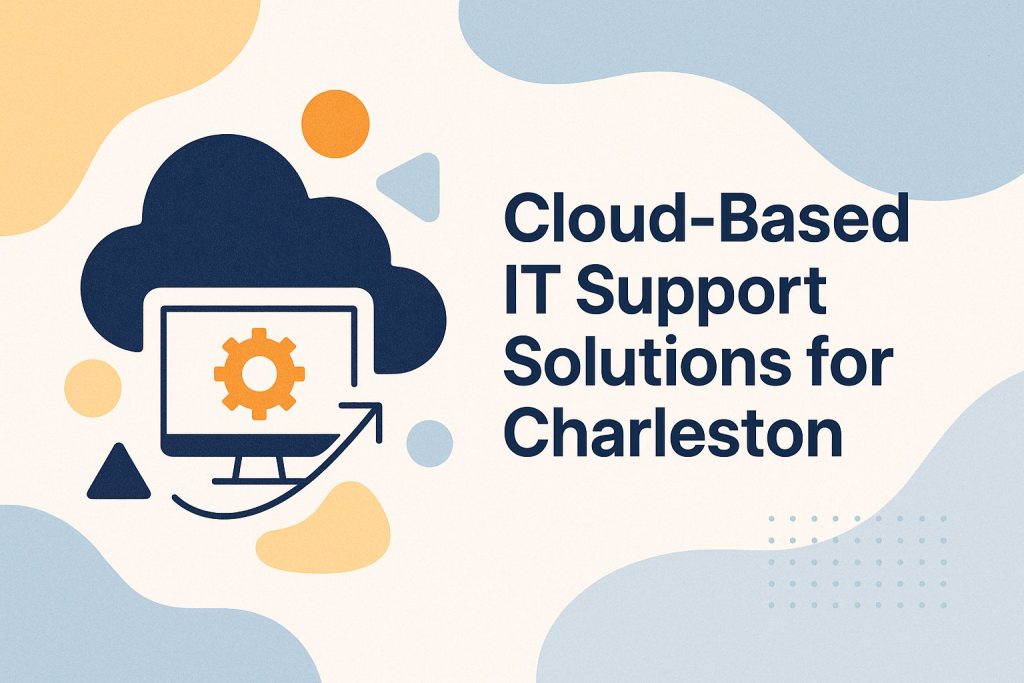Cloud Solutions for Small Businesses: A Charleston Business Guide

Cloud computing helps small businesses. It offers flexibility, cost savings, and improved collaboration.
This guide looks at three types of cloud solutions: public, private, and hybrid. It helps you find the best option for your business needs. It outlines the implementation process. It also addresses challenges like security, integration, and cost strategies. By the end of this guide, readers will understand how to use cloud computing effectively.
Explanation of Cloud Computing and its Benefits
.jpg_00.jpeg)
Cloud computing changes how small businesses manage IT in Charleston. It offers scalable solutions online, improving business continuity. It includes services like Software as a Service (SaaS), Infrastructure as a Service (IaaS), and Platform as a Service (PaaS). These services provide data storage, cybersecurity, and tools for remote work, without needing extensive on-site infrastructure.
This technology helps small businesses reduce capital expenditures. They no longer need to invest in costly hardware or maintain complex systems. Flexibility is a key advantage, enabling businesses to quickly adjust resources in response to their fluctuating needs while ensuring operational efficiency.
Productivity improves when teams collaborate easily from different locations. They use tools that provide strong security for sensitive information.
Using cloud solutions helps small businesses in Charleston streamline operations and gain a competitive edge in the digital market.
Types of Cloud Solutions for Small Businesses
Small businesses can use different cloud solutions. Each solution meets specific needs and enhances technology adoption.
These solutions include:
- Software as a Service (SaaS) for software applications, including accounting software and e-commerce platforms,
- Infrastructure as a Service (IaaS) for IT infrastructure,
- Platform as a Service (PaaS) for application development.
This variety allows businesses to achieve flexibility, improve user-friendly experiences, enhance user adoption, and ensure seamless integration with their existing systems (our benefit-focused guide to IT support solutions for small businesses covers this in detail).
Public, Private, and Hybrid Cloud Solutions
Public, private, and hybrid cloud solutions each present distinct advantages for small businesses, enabling them to customize their cloud strategy according to specific needs and compliance requirements.
Public clouds offer scalable resources that can be accessed over the Internet, while private clouds provide enhanced security and control. Hybrid clouds effectively combine the best aspects of both by integrating on-premises infrastructure with cloud services, thereby optimizing cost and performance.
By leveraging public cloud services, small businesses can swiftly scale their operations in response to market demands without making significant investments in physical infrastructure. This approach fosters increased agility and reduces overhead costs.
In contrast, private clouds are designed for organizations that prioritize data security and must comply with industry regulations, offering dedicated resources to protect sensitive information.
Hybrid cloud solutions offer a flexible model that allows businesses to manage workloads across both private and public environments, enhancing adaptability while ensuring control over critical areas.
However, these options also present challenges, such as the necessity for skilled personnel, potential integration difficulties, and ongoing management responsibilities. Therefore, careful consideration is required to align these factors with the unique needs of each small business.
How to Choose the Right Cloud Solution for Your Business
Cloud migration is a crucial step for small businesses to consider when choosing the right solution.
Selecting the appropriate cloud solution for small businesses requires a thorough evaluation of operational needs, budget constraints, and potential for future growth.
Key factors to consider include effective project management and:
- Assess vendor offerings, including local vendors,
- a clear understanding of service level agreements,
- and the alignment of cloud solutions with current technology trends and business objectives. Related insight: Small Business IT Support | Technology Management
This approach aims to improve efficiency and provide a competitive edge.
Factors to Consider and Questions to Ask
.jpg_01.jpeg)
When evaluating cloud solutions, small businesses should consider key factors. These include technical expertise for cloud migration, quality of customer support, and customization options.
They must ask critical questions about data security, integration capabilities, and scalability for long-term success.
Additionally, businesses must assess the costs of cloud services, including subscription fees, storage costs, and possible hidden charges.
Understanding the vendor’s compliance with industry regulations clarifies if their services meet operational requirements. It is prudent to explore the trial options that many providers offer, allowing businesses to test performance before making a commitment.
A mindful evaluation helps small businesses navigate cloud offerings and find the best solution for their goals.
Implementing Cloud Solutions for Small Businesses
Implementing cloud solutions requires careful planning, strong strategies, and effective training for employees.
Small businesses should focus on critical elements like:
- Data backup solutions
- Disaster recovery plans
- The enhancement of user experience through user-friendly interfaces
to ensure seamless transitions to cloud-based environments. If you are interested, you might appreciate our insights on how to boost productivity and security for Charleston SC small businesses.
Step-by-Step Guide and Best Practices
This process starts with evaluating current systems to identify gaps and improvement opportunities. Following this analysis, the selection of a cloud model-whether public, private, or hybrid-should be guided by specific requirements, budget constraints, and scalability potential. Engaging stakeholders during the planning phase is essential to secure buy-in and support.
Incorporating tools such as cloud management platforms can enhance visibility into resource utilization, while implementing security frameworks will protect sensitive data. Training initiatives should encompass not only technical skills but also encourage a cultural shift towards cloud-friendly practices, fostering collaboration and innovation throughout the organization.
Common Challenges and Solutions for Small Businesses
Small businesses frequently encounter various common challenges when adopting cloud solutions. These challenges include concerns regarding cybersecurity, integration with existing systems, effective cost management, and adapting to market trends.
Addressing these issues necessitates a strategic approach to ensure business continuity, minimize disruptions, and achieve zero downtime during the transition.
Addressing Security, Cost, and Integration Concerns
.jpg_10.jpeg)
Addressing security concerns is paramount for small businesses adopting cloud solutions, necessitating robust network security measures, compliance protocols, and cost-effective strategies to protect sensitive data. Effective integration with existing CRM systems enhances efficiency and creates a seamless user experience.
To address these challenges, small businesses should implement:
- Multi-factor authentication
- Encryption protocols
These measures strengthen data security. Regular vulnerability assessments and employee training on phishing threats are essential. They promote a culture of security awareness.
When considering costs, choose cloud solutions with built-in APIs. They connect easily with other applications. This creates a cohesive technological ecosystem that boosts productivity and user satisfaction.
Final Thoughts on Cloud Solutions
Cloud solutions are evolving. Small businesses must embrace digital transformation to be competitive.
These innovations will streamline processes. They also give access to advanced technologies and resources that may be too costly for small businesses to maintain alone.
With the shift in cloud industry trends toward greater integration of Internet of Things (IoT) and edge computing, small businesses face a crucial opportunity. They have the opportunity to harness these developments, including SaaS and PaaS, to optimize operations and improve customer experiences.
Leveraging cloud solutions like resource management and CRM systems helps small businesses grow sustainably. This prepares them to face tomorrow’s market challenges with resilience and adaptability.
Frequently Asked Questions on Cloud Solutions for Small Business Growth
What is the difference between public and private cloud solutions for small businesses?
Public cloud solutions are a common form of IaaS. They are hosted by a third-party provider and accessible to many users online. They offer high availability and cost efficiency. Private cloud solutions, on the other hand, are used exclusively by a single organization and are typically hosted on-premises or by a dedicated provider.
What are the benefits of using cloud solutions for small businesses, including virtualization?
Cloud solutions offer increased flexibility, scalability, remote access, and cost savings for small businesses, enhancing their digital infrastructure significantly. They also provide access to advanced technologies and resources that may not be feasible for a small business to maintain on their own.
How can cloud solutions improve collaboration within a small business?
Cloud solutions, such as those offering team collaboration tools and mobile access, allow for real-time collaboration and communication among team members, regardless of their physical location. This can improve productivity, efficiency, and overall teamwork within a small business.
Are there any security risks associated with using cloud solutions for small businesses?
There is always a risk of security breaches with any type of technology, but reputable cloud solution providers offer online security measures and managed services to protect their clients’ data. Small businesses should vet their cloud providers carefully. They must also update and monitor their security protocols regularly.
What types of small businesses can benefit from using cloud solutions?
Cloud solutions, part of a broader SME technology strategy, are beneficial for a wide range of small businesses, from startups to established companies. They can be particularly useful for businesses with remote or distributed teams, as well as those looking to reduce IT costs and improve efficiency.
How can a small business in Charleston, SC find the right cloud solution provider?
There are several factors to consider when choosing a cloud solution provider, including their reputation, pricing, security measures, and customer support. It is best to research and compare multiple providers to find the one that best fits the needs and budget of your small business in Charleston.




